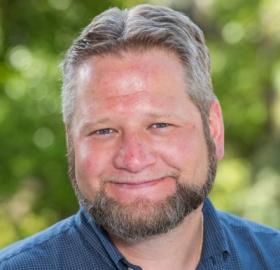Frank DeMatteo
Professor & School Psychology Graduate Program Coordinator
Dr. DeMatteo received his undergraduate degree in psychology at the University of Scranton (B.S. 1996) and graduate degrees in educational psychology and school psychology at Indiana University of Pennsylvania (M.Ed. 1997; Ed.D. 2005). Dr. DeMatteo is currently a Professor and Coordinator of the School Psychology Program in the Department of Psychology at Cal-Poly Humboldt. Before coming to Cal Poly Humboldt, he was the Director of the School Psychology Program at Marywood University (2009-2017) and a temporary full-time Assistant Professor in the Educational and School Psychology Department at Indiana University of Pennsylvania (2007-2008). Dr. DeMatteo has been a Nationally Certified School Psychologist (NCSP) since 1999 and he has worked as a school psychologist practitioner and Director of Student Services in K-12 public school settings in Pennsylvania and Maryland. His research interests include: family-school relations, providing feedback results to parents, and post-school transition.
Dr. DeMatteo has systematically pursued a broad scholarship agenda that has focused on improving outcomes for k-12 students through assessment, feedback, intervention, and transition. The primary purpose of his scholarship agenda through ongoing collaboration is to apply principles of education and school psychology to the k-12 public education setting. Specifically, he is interested in developing resources for k-12 public school teachers, administrators, parents, and school psychologists to facilitate positive outcomes for students. Dr. DeMatteo’s scholarship agenda is driven by his 10 years as a school psychologist practitioner in the K-12 public school setting.
As products of his scholarship agenda, Dr. DeMatteo has authored peer reviewed articles that have applied principles of social skills training to students with Autism Spectrum Disorder, investigated teacher perceptions of literacy and technology, and provided a “how-to” guide for research mentors and graduate students to conduct a statistical power analysis[F1] . His most recent publications explored transition-based outcomes for students with Autism Spectrum Disorder and examined if additional preparation of general education teacher candidates improved their ability to address student needs. He has also coauthored a book chapter about consultation and manuscripts that applied mindfulness to the classroom setting and discussed a collaborative training model between school psychology and education.
My teaching methods primarily consist of making information meaningful and organized for the students. I explicitly link concepts together and have the students anticipate potential pitfalls and benefits to the course topics during instructional delivery. Student participation is actively and continuously solicited and effective oral and written communication skills are emphasized. Multiple examples of where course topics can be applied are intentionally identified. Performance feedback is regular following informal group review, quizzes, exams, projects, and presentations. Opportunities for improvement are clearly identified while providing suggestions and recommendations. Instruction and assessment are on-going and inherently related. Grading and expectations for all assignments, competencies, and class participation is transparent and based on rubrics attached to each syllabus and distributed during the first meeting of each class.


